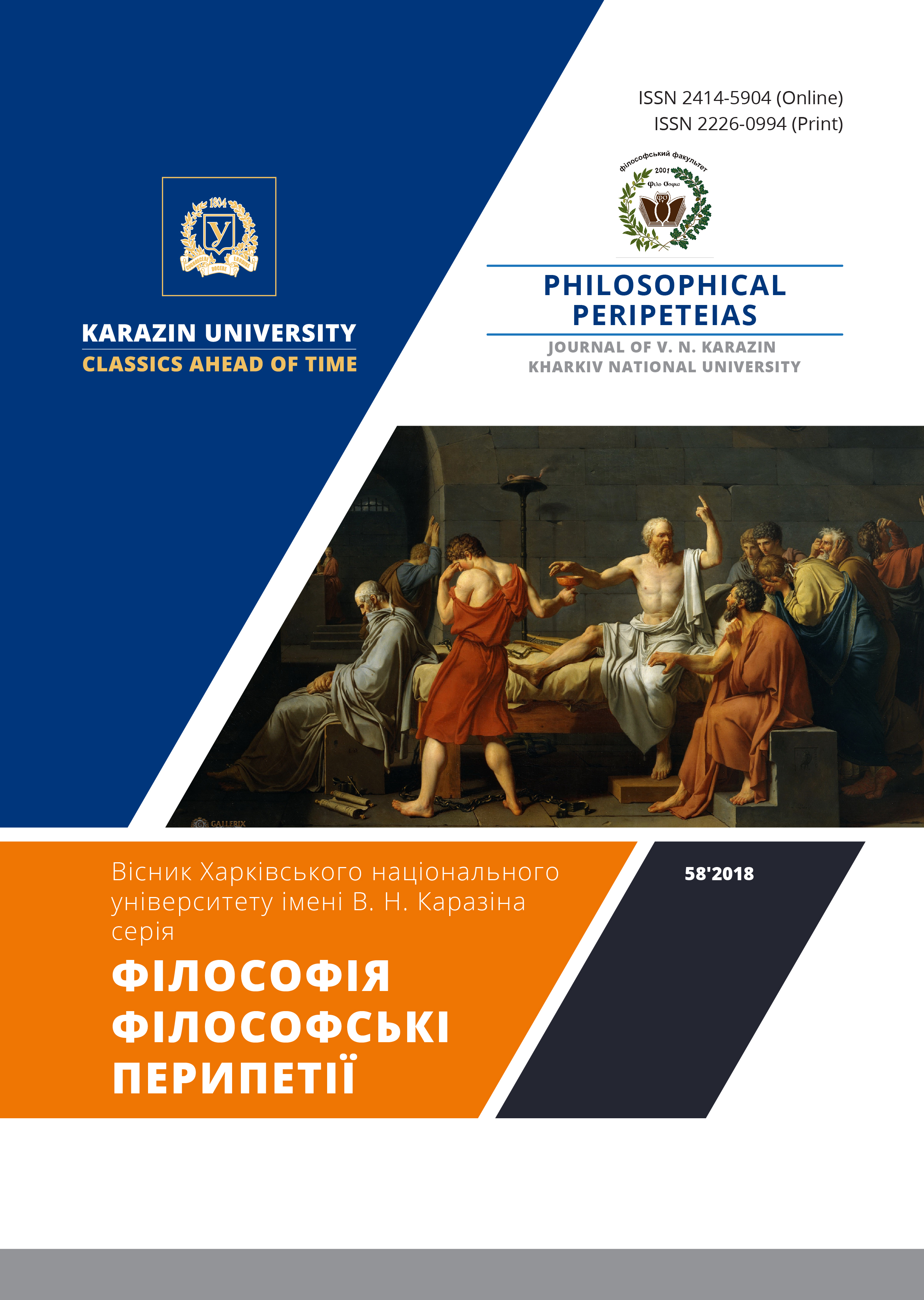POST-ANTROPOCENTRIC HYPOSUBJECTIVATION
Abstract
The article considers hyposubjectivation as the most essential kind of subjectivation in a post-Antropocentric context. Hyposubjectivation is a variety of subjectivation that takes into account the possibility and necessity of anthropological nothing or even less than nothing, the non-presence of a human being. In comparison with hyperobjects from weather catastrophes to celebrities hyposubjects appears as lacanian lamella, deleuzian double fan of a sensation or, in a more philosophical-anthropological formulation, as an uncanny ontological strange stranger. Post-Antropocentric particularization and singularization of a human being bring it to the statement of not-All as othing or hing, less than nothing. And it’s a statement of hyposubject with its contingency in n-dimentions, agentiality, resistance to any -isms, holeness in a weird reality. In the aricle it’s shown that exactly hyposubject, strange stranger realizes schizotrategies for openness of a human being, which non-presents in its meontic nothingness, or tactics of mœlting as becoming-Nature. Such an approach is developed in the aspect of non-human turn as a significant philosophical and anthropological direction. The study is based on post-postmodern philosophy, object-oriented ontology, weird, agential realism of intra-actions, etc., when a human being is considered in its manifold in nothingness. Philosophical anthropology in this case is associated with a deep, dark and weird ecology and the human being appears as a natural object devoids of its own nature. The material for the study was inured the actual cultural appearances such as the artworks of Bjork, Olafur Eliasson and A Place of a Bury Strangers, as well as relevant life practices. Thus, the principle of hyposubjectivity of a human being in a post-Antropocentric context is proved.
Downloads
References
Barad, K. (2003). Posthumanist Performativity: Toward an Understanding of How Matter Comes to Matter. Signs, Spring, 801–831.
Braithwaite, M. (2010). Post-Postmodern Icelandic Shamanism. Retrieved from https://ironingboardcollective.wordpress.com/2010/06/08/post-postmodern-icelandic-shamanism-boho-new-age-need-not-apply.
Benjamin, W. (1979). One Way Street And Other Writings. London: NLB.
Björk, (2015). This huge sunlit abyss from the future right there next to you ... : emails between Björk Guðmundsdóttir and Timothy Morton. In Björk, Archives (Vol. IV). London: Thames and Hudson.
Boyer, D., & Morton, T. (2016, January). Hyposubject. Cultural Anthropology, 21. Retrieved from https://culanth.org/fieldsights/798-hyposubjects.
Clemens, J., & Pettman, D. (2004). Avoiding the Subject. Media, Culture and the Object. Amsterdam: Amsterdam University Press.
Deleuze, G. (2006). The Fold: Leibniz and the Baroque. (T. Conley, Trans.). London: Continuum. (Original work published 1988).
Dolar, M. (2013). The Atom and the Void – from Democritus to Lacan. Filozofski vestnik, XXXIV(2), 11–26.
Grant, I. H. (2000). The Chemistry of Darkness. Pli, 9, 36–52.
Hansen, M. (2015). Our Predictive Condition; or, Prediction in the Wild. In R. Grusin (Ed.), The Nonhuman Turn (pp. 101–138). Minesotta: Minesotta UP.
Morelle, L. (2012). Speculative Realism. After finitude, and beyond? A vade mecum. Speculations, III, 241–272.
Morton, T. (2007). Ecology Without Nature: Rethinking Environmental Aesthetics. Cambridge, MA and London: University Press.
Morton, T. (2013). Hyperobjects: Philosophy and Ecology after the End of the World. Minneapolis: University of Minnesota Press.
Negarestani, R. (2008). Cyclonopedia: Complicity with Anonymous Materials. Melbourn: re.press.
Žižek, S. (2012). Less than nothing: Hegel and the shadow of dialectical materialism. London: Verso.
Citations
OLEXANDR OLEXANDROVYCH MAMALUY (1939–2023) AS A RESEARCHER IN THE HISTORY OF PHILOSOPHY
Abashnik Volodymyr (2024) The Journal of V. N. Karazin Kharkiv National University, Series "Philosophy. Philosophical Peripeteias"
Crossref
Authors who publish with this journal agree to the following terms:
- Authors retain copyright and grant the journal right of first publication of this work under the terms of a license Creative Commons Attribution License 4.0 International (CC BY 4.0).
- Authors are able to enter into separate, additional contractual arrangements for the non-exclusive distribution of the journal's published version of the work (e.g., post it to an institutional repository or publish it in a book), with an acknowledgement of its initial publication in this journal.
- Authors are permitted and encouraged to post their work online (e.g., in institutional repositories or on their website) prior to and during the submission process, as it can lead to productive exchanges, as well as earlier and greater citation of published work.






3.gif)




